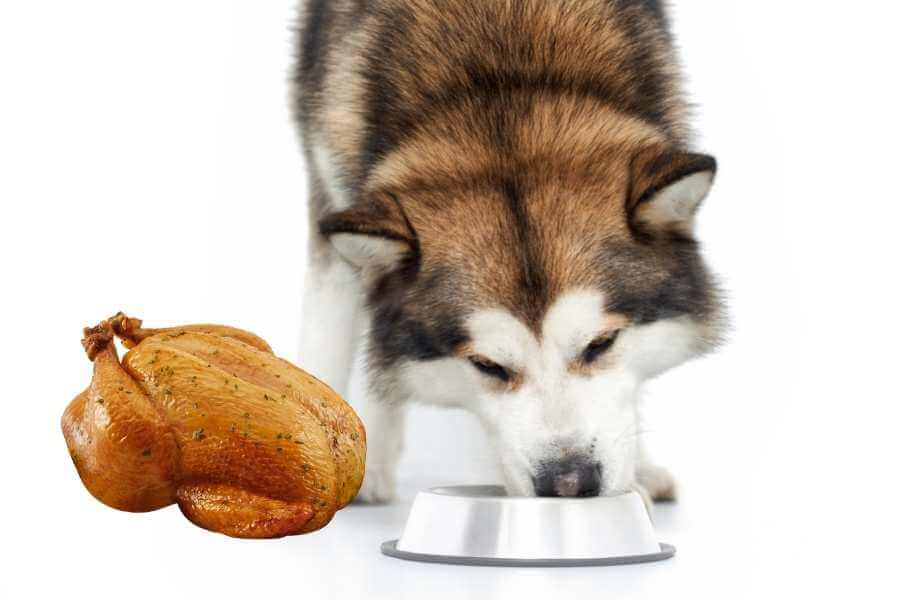The majority of individuals enjoy eating chicken. There are several reasons why chicken is so widely consumed by people.
A lot of dog owners choose to give their huskies the same foods they eat.
Because of this, a lot of husky owners wonder, “Can I feed my husky chicken?”
You can give chicken to your huskies, is the quick answer.
But before feeding chicken to your husky, there are a lot of things you should be aware of.
We will address every concern you may have about feeding chicken to your huskies in this post.
Table of Contents
Is Chicken Bad for Huskies?
Not at all. Huskies can eat chicken. Any unseasoned chicken that has been baked, grilled, roasted, or poached is perfectly safe.
It is advisable to avoid giving your husky a lot of chicken at once since it might upset their stomachs and, in rare cases, even lead to pancreatitis.
Because there is a chance of cross-contamination if you give your husky raw chicken, stay away from pre-packaged fowl.
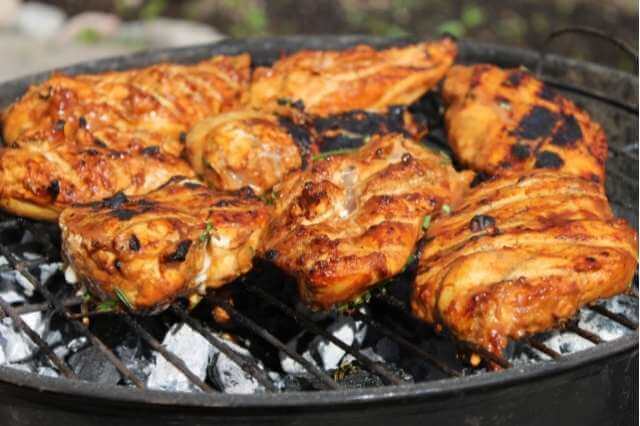
It is crucial to remember that while cooked chicken is preferable to raw since it lowers the danger of salmonella contamination, make sure it is boneless to prevent choking hazards.
If you are feeding raw chicken to your husky for the first time, keep an eye out for any unusual reactions like vomiting or diarrhea.
Even though it is uncommon, certain huskies may have dietary allergies or intolerances, including sensitivity to fowl.
Take your husky to the vet right away if you notice any unusual symptoms following their consumption of raw chicken.
Can Husky Puppies Eat Chicken?
Due to its speed and potential for esophageal or intestinal damage, roasted bones should never be given to puppies.
The bones in a chicken’s head are many; when cooked, they lose part of their softness and become harder.
They also shatter more easily, making them more problematic.
Therefore, if you wish to share cooked chicken with your dog, you need to remove the bones from the chicken.
Can Huskies Eat Raw Chicken?
Chicken is consumed by Huskies. However, it is best to serve it cooked (with no seasoning).
Although giving raw chicken to your husky is not inherently harmful, there is always a chance that they might get Salmonella, which can cause food poisoning.
Similar to people, dogs may get infections like salmonella by eating raw meat.
A void giving your husky chicken bones, and be aware that some seasonings might be dangerous to dogs.
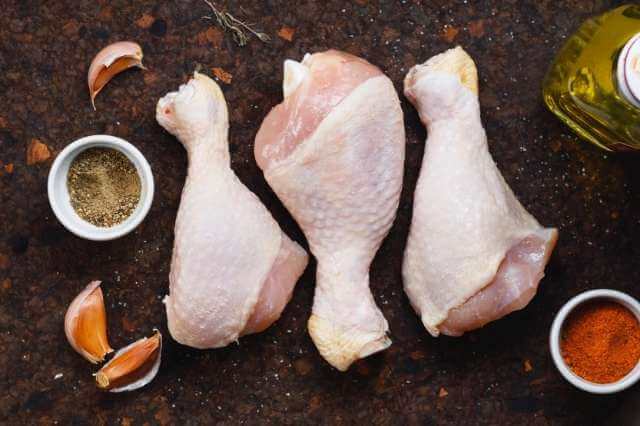
Have you ever been eating supper when your husky suddenly starts to nip you in the eyes with these blue pups that are pleading for a bite?
You don’t have to feel terrible about giving them your chicken, though.
Here are some fundamental guidelines to follow while preparing chicken for your husky:
Removes the Meal’s Bones
There aren’t many chickens that have bones. Dogs gnaw on other bones besides chicken bones because they are stronger.
Broken chicken bones might result in internal damage. Hurting your pop is the last thing you want to do.
Boil the Chicken
Considering that it’s the simplest approach to ensure nothing is contaminated, boiling chicken breasts will be the greatest method of preparation for your dog.
If you like, you may cook the entire chicken rather than simply the breast.
Chicken Should Be Cut Into Even Pieces
Trim the chicken. Despite the fact that your dog should consume some healthy fat, you should cut any chicken you offer it. That definitely is better.
Cook Chicken
This truly applies to whatever meat you give your husky, not just the chicken. Dogs can be harmed by salmonella and other hazardous toxins to humans.
Beyond Chicken
The only thing you should be doing is this diet. Your dog will require much more than simply protein to survive.
Therefore, be careful to open your dog wider than a chicken breast.
Give them because Husky will burn up a lot of carbohydrates since he is so enthusiastic.
Leave out the spices
While we can tolerate a hiccup stomach, we can’t take black pepper on our chicken.
Therefore, avoid seasoning or adding any spices to your dog to guarantee that its digestion is effective.
Are Chicken Bones Dangerous for Huskies to Eat?
Husky should not be given chicken bones since it injures their internal organs.
Although chicken bones have the potential to break and pierce internal organs, this does not guarantee that it will always happen.
If your dog has already ingested bones, you can take a closer look at it now, but this is obviously a risk we want to prevent as much as possible.
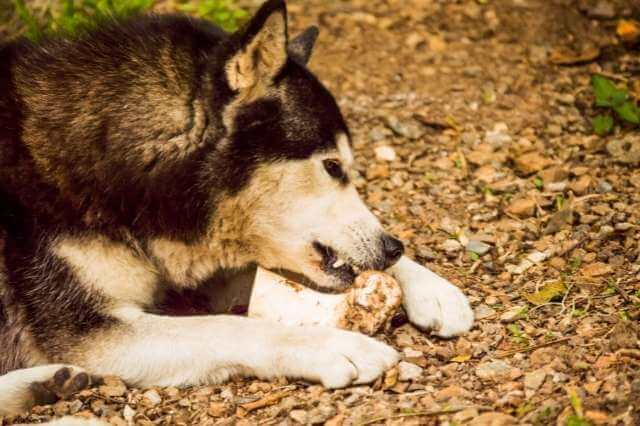
Concerning the warning signs and symptoms of internal bleeding or blockage, see your veterinarian.
You should contact a veterinarian if you observe that your dog is lethargic, experiencing constipation, having trouble urinating, passing bloody feces, vomiting, having a swollen stomach, not eating, or otherwise seeming sick.
Every day, look for any visible bone pieces in your dog’s feces.
When to Avoid Giving Your Pet Husky Chicken?
Even though they would urge you endlessly, there will be situations when you should not give chicken to dogs or even cats.
You should refrain from feeding your Husky this specific breed of fowl in the following two situations:
When it causes them digestive issues – Regardless of whether this is an incorrect bowel movement or gas, you should probably stop. This can indicate that your dog has allergies.
This actually occurs. Actually, it’s one of the most prevalent allergies in dogs. Digestion problems and excessive shedding are two effects of food allergies.
You already have an overweight dog. If your Husky needs to trim down, it might be time to take a break from the chicken.
In general, you should limit everything. When it comes to your dog’s food, you should consult your veterinarian.
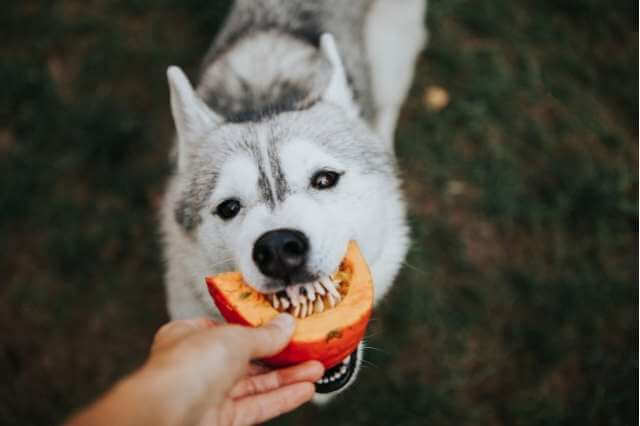
Make careful to trim the fat off the chicken before feeding it to your dog.
It’s possible that you’re giving your dog too much rather than that they have an allergy.
You shouldn’t constantly feed your Husky chicken. Make it around 10% of their whole diet.
You could have a better sense of whether your dog is allergic or not if you reduce your consumption of chicken.
Try chicken and rice if your dog has gastrointestinal issues with simply chicken.
This is supposed to assist with any diarrhea or other issues your dog may be having.
How Much Chicken Should I Feed to My Husky?
What much of chicken should I give my dog each day? The ideal chicken serving size for dogs is determined by their weight.
For every 20 pounds of body weight, if you are giving your dog fresh dog food, you should give them between 1/4 and 1/3 cups of cooked chicken.
Despite the fact that chicken is a fantastic source of protein, you need to make sure their diet also contains the right amount of vitamins, minerals, and fiber.
These demands cannot be satisfied by chicken alone.
FAQs
Why Does Chicken Cause My Husky to Poop?
Not every husky can consume chicken. Chicken is still considered an allergy and can have a detrimental impact on sensitive canines.
You shouldn’t offer chicken to your husky in the future if he develops diarrhea shortly after eating it.
It’s also recommended to discuss this matter with a licensed veterinarian because he could require more testing.
Can I Feed Chicken Breast to My Husky Every Day?
You may provide daily chicken broth for your dog.
If your dog needs more protein in his diet, adding cooked, unseasoned chicken to his regular meals is a simple solution.
In addition, if you run out of pet food, it works great as a meal replacement.
Can Huskies Eat Just Chicken?
Huskies are unable to survive on a diet of only chicken or all proteins.
Despite the fact that dogs are derived from wolves, certain breeds, like Huskies, have evolved into omnivores and require a diet richer in carbohydrates and vitamins than merely chicken can offer.
Final Thoughts
There you have it, then! You should now be aware of the best technique to introduce chicken to your husky and whether or not he can eat it.
Because huskies move frequently and if they participate in sled races, they labor every day, they require a lot of energy from their meals.
Remember to remove the chicken’s bones before cooking it, as the bones might harm your dog’s stomach internally.
Keep in mind that I’m not a veterinarian and that this is not expert advice. It is important to get in touch with your neighborhood vet if you have any more inquiries.

